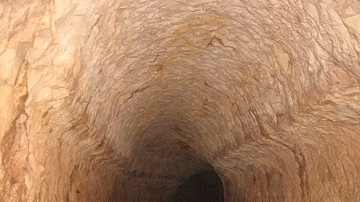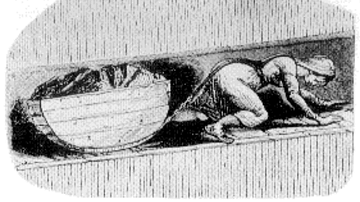Search
Did you mean: Writing?
Search Results

Article
Roman Tunnels
The first tunnels in the Mediterranean were built to transport water from distant springs and mountains to arid areas and cities. They also ensured the constant supply of water when cities were under siege. For example, the 533 m (583 yards...

Article
Education in Roman Spain
There was no compulsory state education for children in any of the western provinces of the Roman Empire. The primary sources are sparse when it comes to the education in Roman Spain, and while some scholars argue for a network of schools...

Definition
Silver in Antiquity
Silver had great value and aesthetic appeal in many ancient cultures where it was used to make jewellery, tableware, figurines, ritual objects and rough-cut pieces known as hacksilver which could be used in trade or to store wealth. The metal...

Definition
Repartimiento
The repartimiento system was a distribution of rights to Spanish colonialists and municipalities, which allowed them to extract forced but low-paid labour from local communities in conquered territories. Designed to replace the inefficient...

Image
Child Pulling Coal in a Mine
An illustration of a child pulling a tub of coal from the mine face to the surface. Child labour was common in mines in Britain and not restricted until the 1842 Mines Act.

Article
Why the Industrial Revolution Started in Britain
The Industrial Revolution saw a wave of technological and social changes in many countries of the world in the 18th and 19th centuries, but it began in Britain for a number of specific reasons. Britain had cheap energy with its abundant supply...

Article
Top 10 Inventions of the Industrial Revolution
The British Industrial Revolution transformed life at work and at home for practically everyone. Noise, pollution, social upheaval, and repetitive jobs were the price to pay for labour-saving machines, cheap and comfortable transportation...

Article
Child Labour in the British Industrial Revolution
Children were widely used as labour in factories, mines, and agriculture during the British Industrial Revolution (1760-1840). Very often working the same 12-hour shifts that adults did, children as young as five years old were paid a pittance...

Article
The Steam Engine in the British Industrial Revolution
Steam power was one of the most significant developments of the Industrial Revolution (1760-1840) in Britain. First invented as a pump in the 1690s, a host of inventors tweaked designs and tinkered with machinery until an efficient and powerful...

Article
Social Change in the British Industrial Revolution
The British Industrial Revolution (1760-1840) witnessed a great number of technical innovations, such as steam-powered machines, which resulted in new working practices, which in turn brought many social changes. More women and children worked...